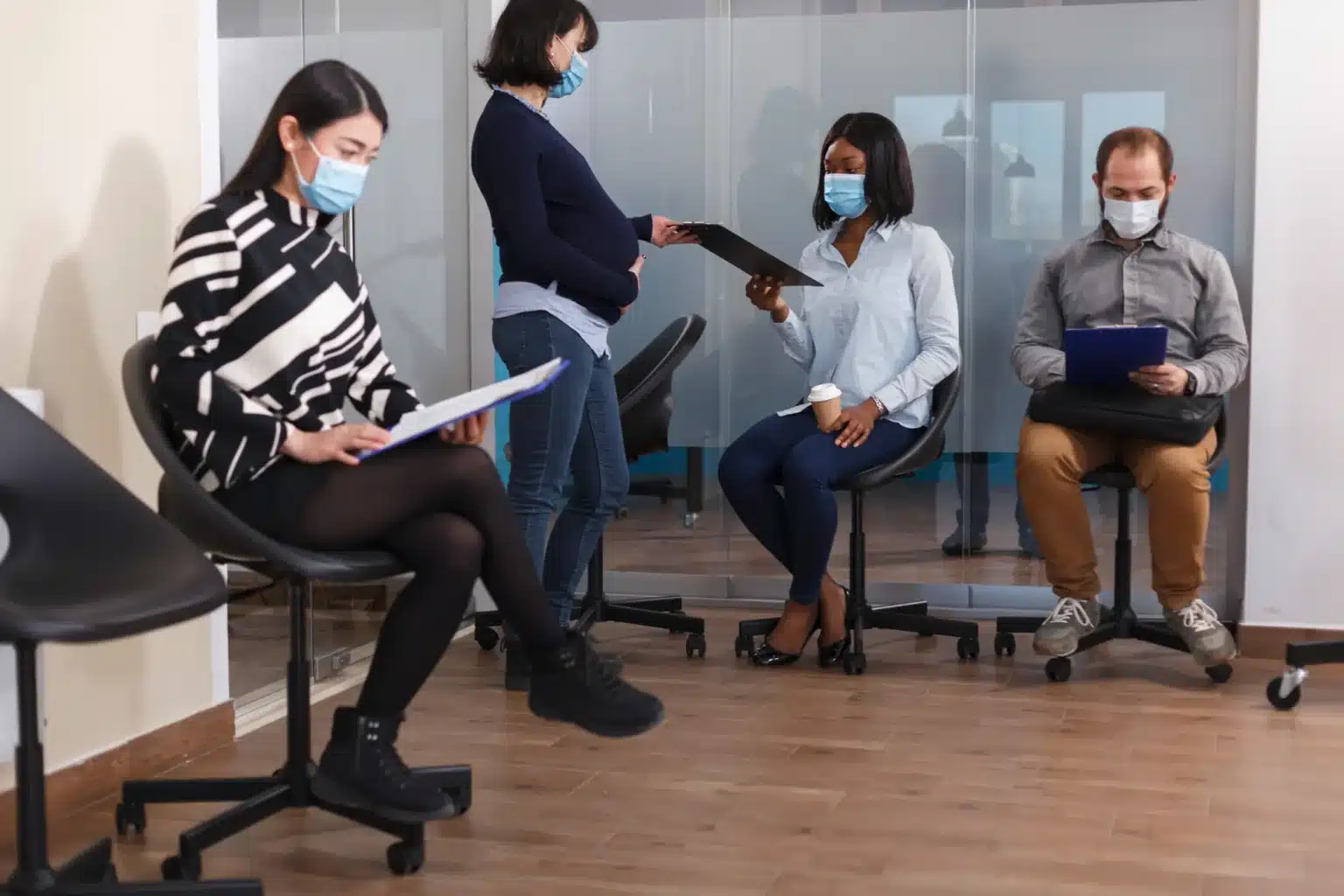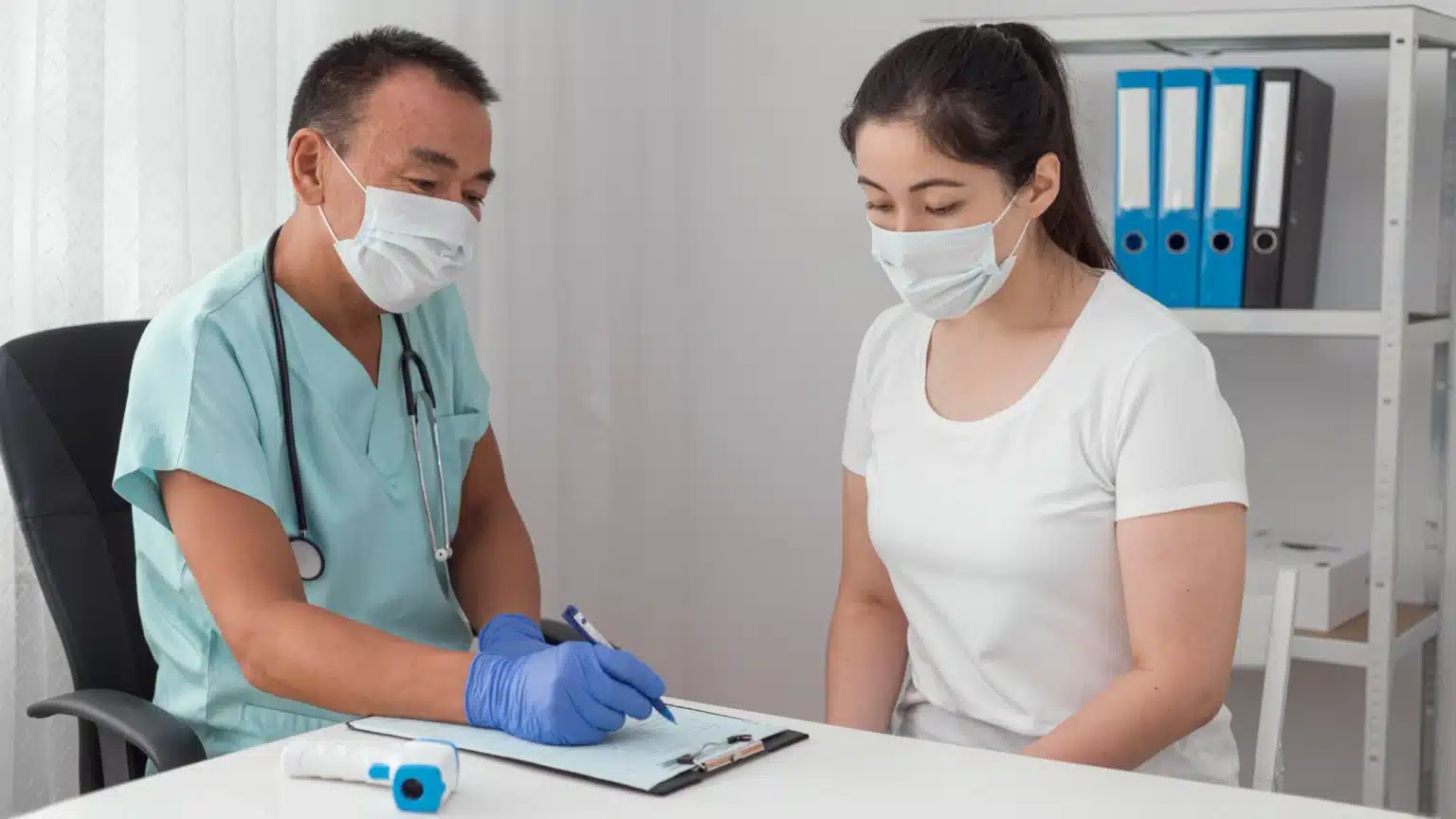Learn more about:
Pneumonia Vaccine
Recommended for: Those at elevated risk of pneumonia and related infections, including children, older adults, and individuals with certain health conditions or lifestyle factors.
Disease prevented: Pneumococcal disease
Price:
₱4,000.00
Find the Nearest SureVax Location:
The PCV13 Vaccine protects against 13 strains of pneumococcal bacteria, which can cause serious infections such as pneumonia, meningitis, and bloodstream infections. It significantly reduces the risk of severe pneumococcal diseases and is an essential preventive measure, especially for young children, older adults, and individuals with weakened immune systems.


₱3,000.00
The Quadrivalent Flu Vaccine provides protection against four common flu strains, including two influenza A and two influenza B strains, offering comprehensive coverage. By reducing the risk of flu-related illness, it plays a vital role in keeping communities healthier, especially during flu season.
Find the Nearest SureVax Location:
Covers 13 different strains, providing broad and reliable protection against common pneumococcal bacteria. This extensive coverage is key to preventing respiratory-related hospitalizations and complications.
Safe and well-tolerated, with mild side effects like arm soreness or low-grade fever. Serious adverse effects are rare.
Targeted toward those with the highest risks for pneumococcal infections, including children, seniors, and people with underlying health concerns.
Who should receive the PCV13 vaccine? When should you get vaccinated?
Stage Level
Priority Beneficiaries
Description
1
Early Years
(Infants and Young Children)
Young children, especially those under five, are at high risk for severe pneumococcal infections due to developing immune systems. The PCV13 vaccine can prevent early childhood respiratory infections that may lead to meningitis or ear infections, ensuring healthier development during crucial growth stages.
2
Health Vulnerabilities (Chronic Conditions)
Individuals with chronic health issues like diabetes, asthma, COPD, or heart disease face heightened risks if they contract pneumococcal infections. PCV13 helps safeguard those with compromised immunity, preventing illnesses that could worsen their conditions or lead to prolonged hospital stays.
3
Increased Exposure (Crowded or High-Contact Environments)
For people living in close quarters, such as nursing homes, long-term care facilities, or dormitories, pneumococcal bacteria can spread easily. The PCV13 vaccine lowers the risk of respiratory outbreaks, protecting both the vaccinated individual and those in their community from serious infections.
4
Advanced Age (Seniors 65+)
Immunity weakens with age, making older adults more susceptible to pneumonia and other pneumococcal diseases. PCV13 offers essential protection for seniors, reducing the risk of hospitalization and severe complications that could impact quality of life and independence.
5
Medical Interventions (Surgical Patients and Immunosuppressive Treatments)
For those undergoing surgeries or treatments that may weaken their immune systems, such as chemotherapy or organ transplants, PCV13 provides an added layer of defense. Vaccination before such interventions can prevent complications from pneumococcal infections during recovery.
Who should receive the PCV13 vaccine? When should you get vaccinated?
Stage 1:
Early Years
(Infants and Young Children)
Primary Beneficiaries
Young children, especially those under five, are at high risk for severe pneumococcal infections due to developing immune systems. The PCV13 vaccine can prevent early childhood respiratory infections that may lead to meningitis or ear infections, ensuring healthier development during crucial growth stages.
Stage 2:
Health Vulnerabilities
(Chronic Conditions)
Primary Beneficiaries
Individuals with chronic health issues like diabetes, asthma, COPD, or heart disease face heightened risks if they contract pneumococcal infections. PCV13 helps safeguard those with compromised immunity, preventing illnesses that could worsen their conditions or lead to prolonged hospital stays.
Stage 3:
Increased Exposure (Crowded
or High-Contact Environments)
Primary Beneficiaries
For people living in close quarters, such as nursing homes, long-term care facilities, or dormitories, pneumococcal bacteria can spread easily. The PCV13 vaccine lowers the risk of respiratory outbreaks, protecting both the vaccinated individual and those in their community from serious infections.
Stage 4:
Advanced Age (Seniors 65+)
Primary Beneficiaries
Immunity weakens with age, making older adults more susceptible to pneumonia and other pneumococcal diseases. PCV13 offers essential protection for seniors, reducing the risk of hospitalization and severe complications that could impact quality of life and independence.
Stage 5:
Medical Interventions
(Surgical Patients and
Immunosuppressive Treatments)
Primary Beneficiaries
For those undergoing surgeries or treatments that may weaken their immune systems, such as chemotherapy or organ transplants, PCV13 provides an added layer of defense. Vaccination before such interventions can prevent complications from pneumococcal infections during recovery.
The Pneumonia Vaccine (PCV13) protects against 13 strains of pneumococcal bacteria, reducing the risk of serious infections like pneumonia, meningitis, and sepsis for long-term health benefits.
Reduces Risk of Severe Illness
Significantly lowers the chances of developing serious forms of pneumonia and its complications, such as sepsis or respiratory failure.
Reduces Healthcare Visits
Minimizes hospitalizations, ER visits, and doctor appointments, leading to fewer disruptions in daily life and less strain on healthcare systems.
Boosts Community Immunity
Widespread vaccination reduces overall transmission, protecting those unable to get vaccinated and supporting community health.
Improves Quality of Life
Reduces the worry of frequent respiratory infections and promotes a more active, worry-free lifestyle, especially for older adults.
Lowers Financial Burden
Reduces costs associated with medical treatment for pneumonia, including lost wages, transportation, and prescription medications.
The Pneumonia Vaccine (PCV13) protects against 13 strains of pneumococcal bacteria, reducing the risk of serious infections like pneumonia, meningitis, and sepsis for long-term health benefits.
Reduces Risk of Severe Illness
Significantly lowers the chances of developing serious forms of pneumonia and its complications, such as sepsis or respiratory failure.
Reduces Healthcare Visits
Minimizes hospitalizations, ER visits, and doctor appointments, leading to fewer disruptions in daily life and less strain on healthcare systems.
Boosts Community Immunity
Widespread vaccination reduces overall transmission, protecting those unable to get vaccinated and supporting community health.
Improves Quality of Life
Reduces the worry of frequent respiratory infections and promotes a more active, worry-free lifestyle, especially for older adults.
Lowers Financial Burden
Reduces costs associated with medical treatment for pneumonia, including lost wages, transportation, and prescription medications.
Learn more about the HPV-4 vaccine, including who it’s for and how it protects against HPV-related diseases.
What is PCV13?
PCV13 (Prevnar 13®) is a vaccine that protects against 13 types of pneumococcal bacteria that can cause serious infections like pneumonia, meningitis, and bloodstream infections.
Who should get the PCV13 vaccine?
● All children under 2 years old
● Adults 65 years or older (discuss with healthcare provider)
● People 2-64 years with certain medical conditions that increase risk
● Immunocompromised individuals
What is the vaccination schedule?
For children:
● 2 months: First dose
● 4 months: Second dose
● 6 months: Third dose
● 12-15 months: Fourth dose (booster)
For adults 65+:
● Single dose
● May need additional pneumococcal vaccines (PPSV23) based on provider recommendation
What are the common side effects?
● Injection site reactions: redness, swelling, pain
● Mild fever
● Irritability in children
● Fatigue
● Headache
● Muscle aches
● Reduced appetite (in children)
Are there serious side effects?
Severe allergic reactions are rare but possible. Seek immediate medical attention if experiencing:
● Difficulty breathing
● Rapid heartbeat
● Dizziness
● High fever
● Severe skin rash
Who should NOT get PCV13?
Severe allergic reactions are rare but possible. Seek immediate medical attention if experiencing:
1. Anyone with severe allergic reaction to previous dose
2. Individuals allergic to any vaccine components
3. Those with severe illness (mild illnesses are okay)
Can PCV13 be given with other vaccines?
Yes, PCV13 can be administered with other vaccines during the same visit at different injection sites.
Is PCV13 covered by insurance?
Most insurance plans cover PCV13. Medicare Part B covers pneumococcal vaccines for adults 65+. Check with your provider for specific coverage details.
How long does protection last?
Protection is long-lasting. Most people don't need additional doses beyond the recommended schedule unless they have specific medical conditions.
Where can I get vaccinated?
● Primary care physician offices
● Pediatrician offices
● Pharmacies
● Local health departments
● Travel clinics
What are the storage requirements?
Healthcare providers must store PCV13 in a refrigerator between 36°F and 46°F (2°C to 8°C). Do not freeze.
Find answers to your questions about the PCV13 vaccine, including who should receive it and what it protects against.
What is PCV13?
PCV13 (Prevnar 13®) is a vaccine that protects against 13 types of pneumococcal bacteria that can cause serious infections like pneumonia, meningitis, and bloodstream infections.
Who should get the PCV13 vaccine?
- All children under 2 years old
- Adults 65 years or older (discuss with healthcare provider)
- People 2-64 years with certain medical conditions that increase risk
- Immunocompromised individuals
What is the vaccination schedule?
For children:
- 2 months: First dose
- 4 months: Second dose
- 6 months: Third dose
- 12-15 months: Fourth dose (booster)
- Single dose
- May need additional pneumococcal vaccines (PPSV23) based on provider recommendation
What are the common side effects?
- Injection site reactions: redness, swelling, pain
- Mild fever
- Irritability in children
- Fatigue
- Headache
- Muscle aches
- Reduced appetite (in children)
Are there serious side effects?
Severe allergic reactions are rare but possible. Seek immediate medical attention if experiencing:
- Difficulty breathing
- Rapid heartbeat
- Dizziness
- High fever
- Severe skin rash
Who should NOT get PCV13?
- Anyone with severe allergic reaction to previous dose
- Individuals allergic to any vaccine components
- Those with severe illness (mild illnesses are okay)
Can PCV13 be given with other vaccines?
Yes, PCV13 can be administered with other vaccines during the same visit at different injection sites.
Is PCV13 covered by insurance?
Most insurance plans cover PCV13. Medicare Part B covers pneumococcal vaccines for adults 65+. Check with your provider for specific coverage details.
How long does protection last?
Protection is long-lasting. Most people don't need additional doses beyond the recommended schedule unless they have specific medical conditions.
Where can I get vaccinated?
- Primary care physician offices
- Pediatrician offices
- Pharmacies
- Local health departments
- Travel clinics
What are the storage requirements?
Healthcare providers must store PCV13 in a refrigerator between 36°F and 46°F (2°C to 8°C). Do not freeze.
It’s better to be safe than sorry.
Get vaccinated today.
Book your vaccination today!
Resources:

Shingles in Younger Adults: What You Need to Know
While shingles is commonly associated with older adults, younger adults can also develop the condition, particularly if they have weakened immune systems. Shingles, or herpes

Postherpetic Neuralgia: Understanding the Lingering Pain After Shingles
Shingles can cause more than just a temporary rash. In some cases, individuals experience a lingering pain known as postherpetic neuralgia (PHN), which occurs after

